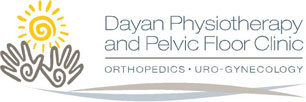Prostate Cancer and Physical Therapy
What every pelvic floor physical therapist needs to know regarding prostate cancer diagnosis and treatment from screening to palliative care, including bladder/bowel (stress incontinence, urgency) and sexual health sequelae and their evidence-informed physical therapy interventions
Why choose our courses?
Course Information
Course will include theory, demonstration, and practical sessions including the use of EMG biofeedback to address urinary, fecal and sexual side effects of prostate cancer treatment within a physiotherapy scope of practice. . Class size is limited to ensure optimum learning, practice, and translation of skill. This course is open to Registered Physical Therapists and physical therapy students. The physiotherapist will leave the course with new skills to use immediately on return to their office the next day!
There will be a demonstration of a subjective and objective assessment and treatment with a client who has undergone prostate cancer treatment. Course participants will have the opportunity to use course clinical skills with clients with prostate cancer who are naïve to (who have never had) physiotherapy treatment*. Understandably, assessment and treatment interventions will be dependent on client presentation, ability and consent. Course participants also participate in the lab/practical session.This may involve perineal and/or rectal exam.
EMG biofeedback units will be available for each group of 2-3 physical therapists throughout the course for all lab sessions. Prior experience using biofeedback is not required. Learning this skill is another good reason to take this course!
*Pelvic Rehab Courses reserves the right to make changes to client participation prior to the course date.
Prerequisites
This course is open to Registered Physical Therapists or physical therapy students who have completed a basic introductory pelvic floor course with instruction in internal exams.
For further information please:
Call 604-739-3133 Between 8:00am – 4:30pm (Monday – Friday)
or email PelvicRehabCourses@gmail.com
There are no Prostate Cancer and Physiotherapy Courses scheduled at this time. Contact Pelvic Rehab Courses to organize a course near you!
Other courses available:
Female and Male Urinary/Fecal Incontinence and Pelvic Organ Prolapse: An intensive intro course
Why choose our courses?
All courses:
- Our courses focus on active rather than passive techniques to add to your tool kit that are evidence-informed. Learn techniques that are not myofascial or trigger point related.
- Emphasis on client empowerment through education and active treatment.
- Learn to differentiate between motor control and strength issues.
- Understand the value of skilled EMG biofeedback use (for pelvic floor courses).
- Get practical experience using EMG or Real-Time Ultrasound Imaging biofeedback in small groups.
- Develop critical thinking skills in the assessment and treatment components of the course. We want all course participants to receive an honorary Sherlock Holmes Degree! Return to the clinic the next day with the ability to critically analyze your subjective and objective findings. There is no recipe. Every question you ask and intervention you give needs to have a purpose based on your critical analysis and thinking. If you don’t understand during the course – Ask us! Challenge us!
- Explore concepts of hypertonicity and increased tone in voluntary muscles with no neurological damage.
- 1/2 day shadow OR 1-hour scheduled phone/FaceTime or Skype consult with course instructor within 3 months of course completion.
Introductory Pelvic Floor, Incontinence, Prolapse and Prostate Cancer Courses:
- Evidence-based treatments for muscle strength and endurance gains.
- Recognize when estrogen or pain medication may or may not be helpful and how to have this discussion with patients and physicians.
- Get practical experience using EMG or Real-Time Ultrasound Imaging biofeedback in small groups.
- Understand the sexual health impact of prostate cancer treatment and the role of physiotherapy
Pain Condition Courses:
- Evidence-informed active (rather than passive) treatment techniques for your tool kit for pain conditions.
- Direct application of mindfulness and CBT skills into physiotherapy interventions.
- Evidence-based intervention for pain conditions.
- Education on the evolution of male and female sexual response theories.
- Education on current female and male sexual response theories and how to directly apply this information within a physiotherapy scope of practice and specific treatment interventions.
- Recognize when estrogen, corticosteroids and pain medication may or may not be helpful and how to have this discussion with patients and physicians.
- Get practical experience using EMG or Real-Time Ultrasound Imaging biofeedback in small groups.
- Explore concepts of hypertonicity and increased tone in voluntary muscles with no neurological damage.
For further course or registration information please contact: (604) 739-3133 or email PelvicRehabCourses@gmail.com
Marcy Dayan is a registered physiotherapist and is a designated Clinical Specialist in Women’s Health with expertise in the management and treatment of both female and male bladder and bowel control, vaginal/genital/rectal pain, diastasis abdominus and perinatal low back, SIJ and symphysis pubis dysfunction and pain.
Since graduating from UBC with a Bachelor’s Degree in Physiotherapy in 1984, Marcy has completed postgraduate courses in incontinence, pain, sexual health and counseling, pelvic dysfunction and orthopaedics. She has also completed a Master of Health Administration from the University of British Columbia. Active in clinical practice, teaching and research, Marcy works in private practice at Dayan Physiotherapy and Pelvic Floor Clinic as well as in public practice at the Vancouver Coastal Health Authority’s Prostate Cancer Supportive Care program and the Multidisciplinary Vulvodynia Program. She is a clinical faculty member and lecturer on urogenital pathophysiology in the Master of Physiotherapy program at the University of British Columbia.


